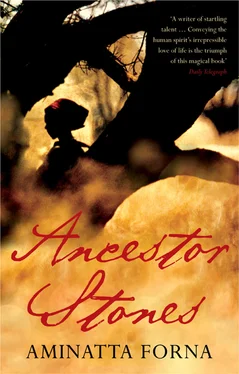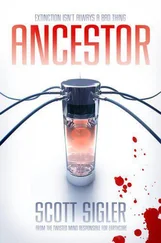And later, inside my grandfather’s house, I pushed open the shutters of a window, finely latticed with woodworm. The plaster of the window sill was flaking, like dried skin. The clay beneath was reddish, tender looking. In the empty room stood the tangled metal wreck of what was once a four-poster bed. I remembered how it was when my grandfather lived and I came here as a child on visits from the city on the coast where my father worked. Then I sat bewildered and terrified before him, until somebody — a grandmother, an aunt — picked me up and carried me away. It was only the fact that my father was the most successful of his sons, though still only the younger son of a junior wife, that made him deign to have me in his presence at all.
In the corner a stack of chests once stood, of ascending size from top to bottom. Gone now. Fleetingly I imagined the treasures I might have found inside. Pieces of faded indigo fabric. Embroidered gowns crackling with ancient starch. Letters on onion-skin parchment. Leather-bound journals. Memories rendered into words. But, no. For here the past survives in the scent of a coffee bean, a person’s history is captured in the shape of an ear, and those most precious memories are hidden in the safest place of all. Safe from fire or floods or war. In stories. Stories remembered, until they are ready to be told. Or perhaps simply ready to be heard.
And it is women’s work, this guarding of stories, like the tending of gardens. And as I go out to them, my aunts, silhouetted where they sit in the silver light of early dusk, I remember the women returning home at nightfall from their plots among the trees.
And I wonder what they would think if they came here now, those hapless port drinkers. Of all the glorious gifts the forest had to offer — fresh coffee.
2 Asana, 1926: Shadows of the Moon
Hali! What story shall I tell? The story of how it really was, or the one you want to hear? I shall start with my name, but that is not so easy as you think. I have been known by many names. Not the way you are thinking. You people change your name the way you change your hairstyle. One day braids. Next day hot-comb. You marry and take a stranger’s family name in place of your own. A potho name, no less. But us, we never change the names that tell the world who we are. The names we are called by, yes. These ones may change.
I had another name once, before I had even seen the light of this world. My name was Yankay, the firstborn.
Sakoma: the month of emptiness. The women were making ready, whitewashing their houses, plastering façades streaked by the rain and stained with mould. Soon the doors of every home would be thrown open. Soft, new rice to eat instead of bulgur and mangoes. The hungry season was nearly over.
My mother’s hands were dipped in white, her face and arms flecked. That was how she was always able to remember I was born the week of the last rainfall before the dry season began. I had an appetite, she used to say, such an appetite because I was born at the start of the feast. That day she worked and felt her insides convulse. Pain seeped into her limbs, trickling out of her centre like juice from a lemon. With her right hand she went on smoothing the plaster in arcs like rainbows. The fingers of her left hand she began to click.
I was the firstborn of my father. Not my mother. My mother was a praying wife. My father inherited her from his uncle. After she was widowed she could have returned to her own people as the other wives did. But she stayed and chose a new husband from the younger brothers. She chose my father. It goes without saying that she must have admired him. Not because he had life, was vigorous with ambition, though he had and was those things. But because she didn’t stay a praying wife for long. Within a year she had conceived.
My mother was my father’s first wife. Well, it’s true there was one other praying wife before her, but that one went when my father brought my mother into the house. My mother’s status was high, you see. She had been the wife of a chief. The other woman had lived long enough. She wanted to be mistress in her own house. So she packed her baskets and walked back to her own village where she had sons.
So there was my mother, plastering her house. Alone and painting, no need for anyone else. This is the way she was. When the job was complete she laid the block of wood on the steps of the house and set off to the birth attendant’s hut. By the time she reached the end of the village she was clicking fast. Both hands. It was early morning. The women were sweeping their compounds and the front of their houses. Dust devils danced across the ground. They looked up when they heard the sound of her fingers. Mine was an auspicious birth: my father was already a big man. Every woman who was already a mother laid down her broom and walked. Their fingers picked up her rhythm, until ten, fifteen, twenty women clicked their fingers as one.
I wanted to come to this world, to the place where things happen, I didn’t want to stay where I was. I always had big eyes for this world and I was born with them open. My mother never feared for me. There are some children — you can tell the ones — born with a hunger for life. I was in such a hurry my mother didn’t even have time to drink the infusion of lemon tree leaves. I was born, to the chorus of their fingers, like the sound of crickets announcing the rain.
Afterwards the midwife prepared to bind my mother’s stomach. But my mother kept on clicking her fingers. The midwife pressed ten fingertips into her stomach. Shook her head. Click. Click. My mother asked for some of the tea, and they poured the cool liquid into her mouth. She arched her back. Click. Push. Click.
My brother slid into this world: small, still and silent. At first, they thought he’d gone with the leaves. My mother cradled him and called for him to come back. That was when she took my name away from me and gave it to him. If only he would come back, she promised, he would be the firstborn. She traced his features with her fingers. The baby opened his eyes, black eyes. He stared back at her. And he decided he wanted her. That was how it all began. This thing between him and me. Because his first deed in this world was to take from me what was mine.
We were twins. People thought we were lucky. They used to touch our heads as we passed by. Tap, tap. Stall holders called out to us: ‘Eh, bari!’ Twin! And they offered us delicacies to taste and gave our mother their best price without the bother of haggling. Women bending over their cooking pots lifted the lids and called us over. One month after our birth, our mother made an offering at the house of the twins: chicken eggs and palm wine, foods the spirits like to eat.
When I had three teeth my brother still sucked with his gums. My mother gave me a wooden spoon and a bowl of rice pap. I followed her wherever she went, holding my spoon. One day she sat on her stool and I leaned against her knees. A duck passed us with tiny ducklings trailing in her wake, like porpoises following a fishing boat. Wherever the mother duck walked her babies followed, attached to her by an invisible thread. She stroked my hair: ‘So who is my duckling?’ she asked. Me, I would have cried, if I had known how to speak. She bent down and caught a baby duck in cupped hands; she let me stroke the downy feathers before she released it. The duckling raced, wings flapping, towards its mother. I laughed. But when I saw my brother on my mother’s lap, still suckling with his old man’s gums, stroking her breast and squeezing milk from her nipple, I felt jealous. I wasn’t so pleased to be her baby duck any more.
Читать дальше












